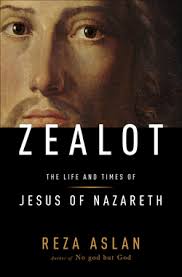After spending a whole two months getting through this book on audio book, I was excited to be done with it. “Zealot: The Life and Times of Jesus of Nazareth” by Reza Aslan spent a whole three weeks on the New York Times Bestseller list after the author was interviewed by Fox News and revealed that he was Muslim. Of course, it is not really all that scandalous for a Muslim religious scholar to author a book on Jesus, especially one based in the historical study of the period, but considering where the U.S. public opinion stands with Muslim’s in general, I understand the hoopla.
and Times of Jesus of Nazareth” by Reza Aslan spent a whole three weeks on the New York Times Bestseller list after the author was interviewed by Fox News and revealed that he was Muslim. Of course, it is not really all that scandalous for a Muslim religious scholar to author a book on Jesus, especially one based in the historical study of the period, but considering where the U.S. public opinion stands with Muslim’s in general, I understand the hoopla.
The book received mixed reviews, and while I think it was very informative and interesting to read, I really appreciated that it gave such a solid evaluation of the historical impact of Jesus’ life and how his notoriety as a religious figure has eclipsed his reputation as a historical person. Credibility of the author and his facts aside, I appreciated the in depth look at the cultural context of the era, even if the notions posed by Aslan weren’t as far-fetched as many readers made it out to be.
Aslan’s thesis rests on the idea that, “The Romans crucified [Jesus] as a rebel, a zealot and a pretender to the Judean throne. The charge on the cross is historical: the Romans took Jesus as claiming to be the messianic king of the Jews. Since only the Roman Senate could appoint kings within the Empire, claiming to be a king was treasonous and punishable by the worst kind of death: torture and crucifixion.” According to Dale B. Martin’s review in The New York Times (2013), this idea is “not as startling, original or “entirely new” as the book’s publicity claims. Nor is it as outlandish as described by his detractors.”
While Martin seems to find the book less than impressive, the Los Angeles Review of Books review by Scott Korb seems to give Aslan’s analysis a bit more credit. “[T]he better story in Zealot is the cautionary one, “he writes, “warning us against turning away from this world, against shrinking in the face of power, against making gods out of good men and women. These are the people we need. And we need them here. Because like ‘Jesus the man’ — as Aslan concludes — it’s people who are ‘worth believing in.’”
I have to concur with Korb. I think the book was worth reading. I particularly enjoyed Aslan’s arguable point that Jesus might not have been the reputable pacifist that many religious sects make him out to be. In fact, in instigating his own revolt against the Roman kingdom, he was repeatedly calling for a (not-necessarily peaceful) rejection of Ceasar’s claim to the title of King.
When Jesus calls himself the Son of Man, using the description from Daniel as a title, he is making a clear statement about how he views his identity and his mission. He is associating himself with the paradigm of the Davidic messiah, the king who will rule on earth on God’s behalf, who will gather the twelve tribes of Israel (in Jesus’s case, through his twelve apostles, who will “sit on twelve thrones”) and restore the nation of Israel to its former glory. He is claiming the same position as King David, “at the right hand of the Power.” In short, he is calling himself king.
It was an interesting read, to say the least, and I’m sure it will tie-in well with my most recent audiobook undertaking: Cleopatra’s biography by Stacy Schiff.
Overall score: 7
Sources:
